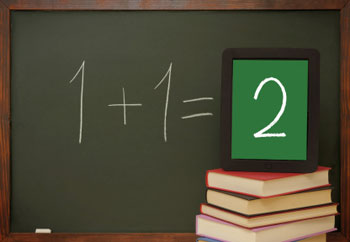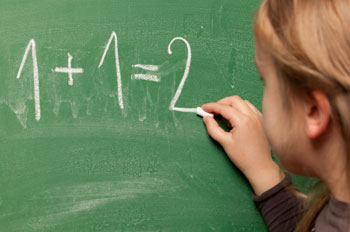Elementary Concepts: Sixth Grade Math
Do you want to assess your child's sixth grade math abilities? This article outlines the skills that most children should understand after completing their sixth grade math course.

By the sixth grade students should already have a firm understanding of basic arithmetic. Grade six helps to cement this knowledge, finalizing a student's grasp of fractions, decimals and mixed numbers, as well as 'greater than' and 'less than' concepts. Sixth graders should understand and be able to use ratios and percentages in a variety of mathematical and word problems and they should know multiples, factors and the prime numbers up to 100.
Measurement skills become important by the end of the sixth grade. A student who has finished sixth grade math should have a complete understanding of basic metric and standard units and all of the prefixes associated with those terms. In sixth grade, students learn squared and cubed units and the measurements of circumferences, parallelograms, rectangles and triangles. A child in the sixth grade will be able to convert between measurement units and calculate the volume of prisms.
Sixth grade students should be able to classify triangles and other shapes by their angle and side properties. Sixth graders are expected to be familiar with coordinate systems and be proficient at plotting points on the graphs.
By before entering the sixth grade, students should have an understanding of basic data collection methods used to produce graphs and charts. During the sixth grade students will learn how to use spreadsheets. Before entering the seventh grade, students should also know how to conduct probability experiments and be able to logically examine and analyze the results.
Other Articles You May Be Interested In
-
MIND Games Lead to Math Gains

Imagine a math teaching tool so effective that it need only be employed twice per week for less than an hour to result in huge proficiency gains. Impossible, you say? Not so...and MIND Research Institute has the virtual penguin to prove it.
-
Should Math Be a Main Focus in Kindergarten?

Should kindergartners put away the building blocks and open the math books? According to recent research, earlier is better when it comes to learning mathematical concepts. But that could put undue pressure on kids, parents and even teachers.
We Found 7 Tutors You Might Be Interested In
Huntington Learning

- What Huntington Learning offers:
- Online and in-center tutoring
- One on one tutoring
- Every Huntington tutor is certified and trained extensively on the most effective teaching methods
K12

- What K12 offers:
- Online tutoring
- Has a strong and effective partnership with public and private schools
- AdvancED-accredited corporation meeting the highest standards of educational management
Kaplan Kids

- What Kaplan Kids offers:
- Online tutoring
- Customized learning plans
- Real-Time Progress Reports track your child's progress
Kumon

- What Kumon offers:
- In-center tutoring
- Individualized programs for your child
- Helps your child develop the skills and study habits needed to improve their academic performance
Sylvan Learning

- What Sylvan Learning offers:
- Online and in-center tutoring
- Sylvan tutors are certified teachers who provide personalized instruction
- Regular assessment and progress reports
Tutor Doctor

- What Tutor Doctor offers:
- In-Home tutoring
- One on one attention by the tutor
- Develops personlized programs by working with your child's existing homework
TutorVista

- What TutorVista offers:
- Online tutoring
- Student works one-on-one with a professional tutor
- Using the virtual whiteboard workspace to share problems, solutions and explanations